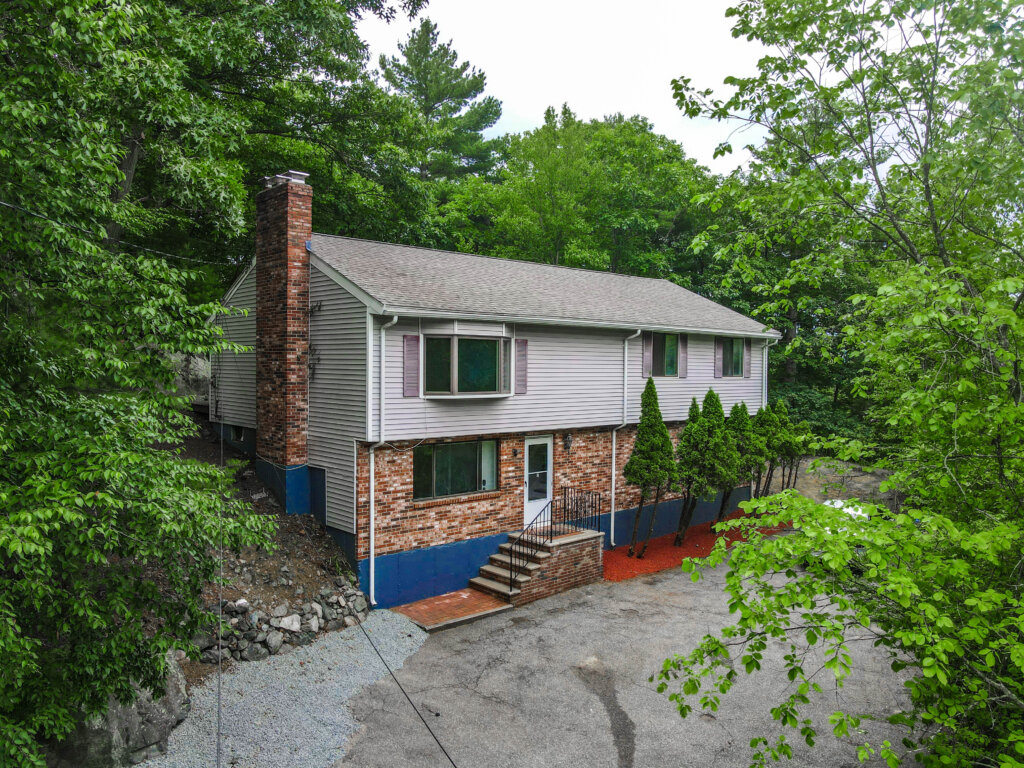Selling a house with unpermitted work can be a challenging process for homeowners in Massachusetts. Unpermitted work includes any renovations, additions, or changes made to a property without securing the necessary permits from local authorities. This can create complications and potential roadblocks during the sale. From a finished basement to an added bathroom or a remodeled kitchen, unpermitted work can significantly impact the selling process.
This guide will walk you through everything you need to know about dealing with unpermitted work when selling a house. We’ll cover how to obtain permits after the work is done, the consequences of unpermitted renovations, when a permit is required, how to check for existing permits on your home, how to legalize unpermitted work, the steps involved in the permitting process, and potential costs you may face along the way.
How to Get a Permit After Work Has Been Done

Assess the Situation
The first step in obtaining a permit for already completed work is to assess the scope of the unpermitted work. This involves identifying all alterations, additions, and improvements made without permits. A thorough inspection by a licensed contractor or home inspector can help you to identify any unpermitted work. Hire a licensed contractor or architect to assess the unpermitted work and provide guidance on how to bring it up to code. They can help you prepare the necessary documentation and navigate the permitting process. You can visit the BBB or check the Mass.gov to check Home Improvement contractor registration lookup. Here is a guide to hiring a contractor.

Contact the Local Building Department
Reach out to your local building department to discuss your situation. They can provide guidance on the necessary steps to obtain permits retroactively. This process often involves submitting detailed plans of the completed work and scheduling inspections. A quick Google search would give you the answer or here are the ones for Revere, Malden, Chelsea, Boston, Winthrop, Lynn, Everett

Prepare Documentation
Prepare detailed plans and specifications for the unpermitted work. These plans should accurately represent the completed work and include any necessary corrections to meet current building codes. Gather all necessary documentation for the unpermitted work. This includes detailed drawings, plans, and specifications of the completed work. If possible, locate any original plans or permits that were issued for other parts of the house to provide context.

Submit Permit Applications
Submit the permit applications to the local building department. The applications should include all required documentation, such as plans, specifications, and descriptions of the work. Be prepared to pay application fees at this stage.

Schedule Inspections
Once the permit applications are submitted, the building department will schedule inspections to verify that the completed work complies with current building codes. Depending on the extent of the work, multiple inspections may be required.

Make Necessary Corrections
If the inspections reveal any code violations or deficiencies, you will need to make the necessary corrections to bring the building up to code. This may involve hiring licensed contractors to ensure the work is done correctly. After making the corrections, schedule follow-up inspections.

Obtain Final Approval
After all inspections are passed and corrections are made, the building department will issue final approval or a certificate of occupancy. This document confirms that the work complies with local building codes and regulations.
Get an offer today, sell in a matter of days.
We buy houses in ANY CONDITION in Massachussetts. There are no commissions or fees and no obligation whatsoever. Start below by giving us a bit of information about your property or call (617) 340-6527…
Consequences of Unpermitted Residential Work
Legal and Financial Risks
Unpermitted work can expose homeowners to legal and financial risks. If discovered by local authorities, you may face fines, penalties, and orders to remove or correct the unpermitted work. This can be costly and time-consuming.
Reduced Property Value
Unpermitted work can reduce the market value of your property. Potential buyers may be deterred by the presence of unpermitted work, fearing future legal and financial complications. This can make selling the house at a fair market price difficult.
Difficulty Obtaining Financing
Lenders often require that all work on a property be properly permitted and compliant with building codes. Unpermitted work can make it challenging for buyers to secure financing, further complicating the sale process.
Complications During Home Inspections
Unpermitted work can raise red flags for inspectors during the home inspection process. This can lead to delays, renegotiations, or even the cancellation of the sale if the buyer is unwilling to proceed.
Liability Issues
Homeowners can be held liable for injuries or damages resulting from unpermitted work. This can include structural failures, electrical fires, or plumbing issues that cause water damage. Liability issues can result in costly legal battles.
Increased Insurance Premiums
Insurance companies may charge higher premiums or deny coverage for properties with unpermitted work. This is because unpermitted work is considered higher risk due to the potential for code violations and safety hazards.
When a Permit is Required for Home Repairs
Common Home Repairs Requiring Permits
- Structural Changes: Any changes to a house’s structural components, such as adding or removing walls, require a permit.
- Electrical Work: Installing new electrical wiring, outlets, or circuits requires an electrical permit.
- Plumbing Work: A plumbing permit is required to modify or install new plumbing systems, including water heaters and sewer lines.
- HVAC Systems: Installing or replacing heating, ventilation, and air conditioning systems requires a mechanical permit.
- Additions: Building additions, such as new rooms or extensions, require a building permit.
- Roofing: Major roofing repairs or replacements often require a permit.
- Windows and Doors: A permit is required to install new windows or doors that alter the structure or size of openings.
- Decks and Patios: Constructing or modifying decks, patios, or other exterior structures requires a permit.
Minor Repairs Typically Not Requiring Permits
- Painting and Wallpapering: Cosmetic changes such as painting and wallpapering usually do not require permits.
- Flooring: Installing new flooring, such as carpet, tile, or hardwood, typically does not require a permit.
- Minor Plumbing Repairs: Minor plumbing repairs, such as fixing leaks or replacing faucets, usually do not require permits.
- Landscaping: Basic landscaping and gardening activities typically do not require permits.
How to Check House Permits

Contact the Local Building Department
The easiest way to check if permits have been pulled for work on your house is to contact the local building department. They maintain records of all permits issued for properties within their jurisdiction.

Use Online Permit Databases
Many municipalities offer online databases where you can search for permits by property address. These databases provide information on issued permits, including the type of work, status, and inspection results.

Review Property Records
Review property records, including title reports and previous sale documents, to identify any mentions of permitted work. These records can provide insights into past renovations and improvements.

Hire a Professional Inspector
A professional home inspector can identify unpermitted work and verify if the necessary permits were obtained. Inspectors are trained to recognize signs of unpermitted alterations and can provide detailed reports.
The Permitting Process

Determine Permit Requirements
Contact the local building department to determine the specific permit requirements for your project. Requirements vary based on the type and scope of work.

Prepare Permit Applications
Prepare the permit applications, including detailed plans and specifications of the proposed work. Ensure that all necessary documentation is included.

Submit Applications and Pay Fees
Submit the permit applications to the building department and pay the required fees. Keep copies of all submitted documents for your records.

Schedule Inspections
Once the permits are issued, schedule inspections at various stages of the project to ensure compliance with building codes. Inspections may be required before, during, and after the work is completed.

Make Necessary Corrections
If the inspections reveal any deficiencies, make the necessary corrections to bring the work up to code. Schedule follow-up inspections as needed.

Obtain Final Approval
After all inspections are passed and corrections are made, obtain final approval from the building department. This will ensure that the work is compliant with local building codes and regulations.
Associated Costs
Permit Application Fees
Permit application fees vary based on the type and scope of work. Typical fees range from $50 to $2,000 or more.
Inspection Fees
Inspection fees are often included in the permit application fees, but additional fees may apply for follow-up inspections. Typical fees range from $100 to $500 per inspection. Because of this, it’s important to get the work done right the first time.
Correction Costs
The costs of correcting code violations or deficiencies vary based on the nature of the work. Hiring licensed contractors to make necessary repairs can cost anywhere from a few hundred to several thousand dollars.
Penalties and Fines
If local authorities discover unpermitted work, you may face penalties and fines. These can range from a few hundred to several thousand dollars, depending on the severity of the violations.
Professional Fees
Hiring professionals such as contractors, architects, or inspectors to assist with the permitting process can add to the overall costs. Typical fees vary based on the scope of the project and the professionals involved.
How Unpermitted Work Affects Property Value
Unpermitted work can significantly affect your home’s value. Potential buyers might be wary of purchasing a property with unknown risks. Unpermitted renovations can also result in appraisal issues, which may lead to a lower sale price or a lengthy negotiation process. By addressing these unpermitted works, whether by obtaining permits or selling the house ‘as-is,’ homeowners can avoid unexpected setbacks during the sale.
Unpermitted work can also lead to legal complications. In some cases, the buyer’s lender may require that all unpermitted work be brought up to code before they approve financing for the purchase. This could involve opening up walls, correcting electrical and plumbing issues, or even removing the work entirely, which can be both time-consuming and costly. These potential legal and financial hurdles make many buyers hesitant to proceed with purchasing a home that has unpermitted work.
Additionally, unpermitted work can create insurance challenges. If the property has unpermitted renovations and an incident occurs, such as a fire or water damage, the insurance company may deny the claim. This puts the new homeowner at risk and can deter potential buyers from making an offer. Addressing unpermitted work upfront or opting to sell the property ‘as-is’ to an investor like Ephesus LLC can help streamline the selling process and ensure a smoother transaction.
How to Resolve Unpermitted Work
If you have unpermitted work, you can resolve it by seeking retroactive permits. This involves submitting plans to the local building department, undergoing inspections, and possibly making alterations to comply with current codes. Another option is to sell the property ‘as-is.’ When selling ‘as-is,’ full disclosure to potential buyers about the unpermitted work is crucial. This approach can still attract cash buyers or investors who are experienced in dealing with such properties.
Q&A
- Q: Can I sell a house with unpermitted work?
A: Yes, you can sell a house with unpermitted work, but it’s important to disclose this information to potential buyers. Some buyers may request that the seller obtain permits before closing, while others may be willing to buy the property ‘as-is. - Q: How much does unpermitted work affect home value?
A: Unpermitted work can lower the home’s value, as it may lead to appraisal issues and increase the buyer’s perceived risk. However, by selling to an investor who specializes in such properties, you may still receive a competitive offer. - Q: What happens if I sell my house with unpermitted work and don’t disclose it?
A: Failing to disclose unpermitted work can lead to legal repercussions. Buyers may sue for damages, claiming that you misrepresented the property’s condition. This can result in costly legal battles and potential compensation to the buyer. Always disclose any unpermitted work to avoid future disputes. - Q: Can unpermitted work be grandfathered in when selling a house?
A: Generally, unpermitted work cannot be “grandfathered in.” Even if the work was completed years ago, it still needs to meet current building codes and regulations. Some municipalities may offer options to legalize older unpermitted work, but this typically involves inspections and potentially bringing the work up to current code. - Q: How does unpermitted work affect a buyer’s ability to get a mortgage?
A: Unpermitted work can complicate a buyer’s ability to secure a mortgage. Lenders often require that all renovations be permitted and up to code to approve the loan. If the unpermitted work is significant, it can lead to loan denial or delay the closing process until the issues are resolved. - Q: Is it possible to get a retroactive permit for unpermitted work?
A: Yes, it is possible to obtain a retroactive permit for unpermitted work. This process usually involves submitting plans to the local building department, having the work inspected, and making any necessary corrections to comply with current building codes. It can be a complex and sometimes costly process, but it can help avoid future legal and financial issues. - Q: Can an investor buy a house with unpermitted work?
A: Yes, investors often buy houses with unpermitted work, especially if they specialize in as-is properties. Investors like Ephesus LLC are experienced in navigating the challenges of unpermitted work and can offer a fair cash price without requiring you to make any corrections or obtain retroactive permits.

Success Story: Turning a Property Challenge Into a Win-Win Solution
We recently worked with a homeowner facing a difficult situation with their raised ranch. The seller had a legal in-law apartment but, after relocating during a market downturn, they finished two additional rooms in the family area to rent to college students. Unfortunately, these extra rooms were not permitted, which made it difficult for the seller to sell the property on the open market. After several failed attempts, including trying to sell the home as a For Sale By Owner, the seller contacted us.
We stepped in and worked closely with the seller to find a solution. Once the tenants were relocated from the unpermitted rooms, we were able to close on the property quickly with a cash offer. The entire process, including transferring the necessary documents, took about a month. After the sale, we addressed the unpermitted work ourselves, ensuring that the property met all legal requirements.
This was truly a win-win. The seller was able to get a fair price for the home without dealing with the headaches of making the repairs or navigating the legal challenges. We, in turn, were able to renovate the home, bringing it up to code, and eventually sold it to a new owner-occupant. This story highlights our commitment to helping sellers out of tricky situations and ensuring smooth, hassle-free transactions.
How Ephesus LLC Can Help
At Ephesus LLC , we understand that dealing with unpermitted work can be overwhelming and expensive. As real estate investors, we specialize in purchasing properties as-is, meaning you don’t need to worry about obtaining permits or making repairs. Here’s how we can assist:
- Quick and Fair Offers: We provide fast and competitive offers, allowing you to sell your property without delay.
- No Permitting Hassles: We buy houses in any condition, so you don’t need to navigate the complex permitting process or make costly corrections.
- Streamlined Process: Our straightforward buying process ensures a smooth and stress-free transaction.
By choosing Ephesus LLC , you can avoid the complications and expenses associated with unpermitted work, making it easier to sell your house quickly and efficiently.
Selling a house with unpermitted work involves navigating a complex and often costly process. From obtaining permits after the work is done to dealing with potential consequences, it’s essential to understand the steps involved and the associated costs. However, if you prefer a hassle-free solution, Ephesus LLC offers a convenient option by purchasing properties as-is. Contact us today to learn more about how we can help you sell your house without the stress and financial burden of dealing with unpermitted work. (617) 340-6527
We buy houses in ANY CONDITION in Massachussetts. There are no commissions or fees and no obligation whatsoever. Start below by giving us a bit of information about your property or call (617) 340-6527…
Download Your FREE Stop Foreclosure Guide Below
Just put in your name and email, click “Submit” and we’ll email you the Free Guide right away.
Download Your FREE “Pros, Cons, and Pitfalls” Guide Below
Just put in your name and email, click “Submit” and we’ll email you the Free Guide right away.

![companies that buy houses [market_city]](https://image-cdn.carrot.com/uploads/sites/18840/2024/04/Company-That-Buys-Houses.jpg)